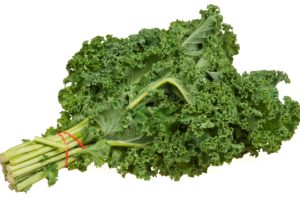
This Nutrition Power Hitter is Better Home-Grown – but get it in any way you can!
Better Home Grown! Kale is definitely a nutrition power hitter. Kale belongs to a family of vegetables that include broccoli, cauliflower and cabbage. Just one cup provides as much vitamin C as an orange, calcium equal to 1 cup of milk, 684% the RDA for vitamin K, and 206% the RDA for vitamin A, and is a significantly good source of protein, iron, the healthy omega-3 fats. Additionally Kale, the powerhouse of leafy greens, contains several different powerful anti-inflammatory phyto-nutrients that have been linked to aiding DNA repair, slowing of cancer cell growth, protecting you from colon and prostate cancers, and benefiting your stomach, liver, and immune system. So why should you grow it? Unfortunately kale tends to accumulate toxins in the soil, which routinely lands it on The Food and Drug Administration’s top 15 dirty list for foods with highest pesticide residue. Typically you can avoid pesticides by buying organic, but in the case of kale studies have shown that even organic kale may contain some pesticide so if you can grow it on your own – the better! The good news is that Kale is super easy to grow. A hardy and forgiving plant, kale will survive both under and over watering, poor soil, and abuse (you can step all over it and it springs right back up.) Kale also happens to be beautiful as a potted plant and can be grown in any yard, patio, or window shelf. Plant some kale and harvest leaves as needed for baked chips or smoothies. Plant some kale and harvest leaves as needed for baked chips or smoothies....
Read More
Still Going Strong (and Stronger) at 89 Years Young
Living with heart disease has been a reality for most of Gene Calman’s life. Diagnosed with heart disease at only 32 years old, Gene has had 3 defibrillators, and two bypass surgeries over the last 56 years. Despite these many physical challenges, Gene maintains a lively personality and positive way of thinking. It was just those personality traits that, last year, helped motivate Gene to take on a new challenge. He read a newspaper article about a fellow World War Two veteran who was training to walk a half-marathon, he was inspired. Gene wanted an active program that would make him work to improve his physical fitness. His past health problems and his age of 89 years made him consider carefully what he wanted to do. He asked his physician about what Kaiser Permanente offered and he discovered the Positive Choice Integrative Wellness Center. He decided to do personal training and liked that the Personal Trainers at Positive Choice were so highly qualified. Trainers at the Positive Choice Wellness Center are required to have a Master’s Degree in Exercise Physiology (the science of human movement and physical adaption), many of the trainers have undergraduate degrees in Kinesiology (the study of human movement) and training in nutrition as well. Gene started training weekly with Exercise Physiologist and Lifestyle Educator Melanie Perkins. When Gene first started training his walking was more of a shuffle and getting in and out of chairs was difficult. He became easily winded and stairs were difficult. Melanie worked to gently increase Gene’s overall body strength. Melanie focused on strengthening his core abdominal (redundant) muscles and the muscles in his legs to give him better balance. After only one year, Gene achieved dramatic results. Gene lost twenty-five pounds, increased his energy and strength; all of which he feels has come as a result of his weekly workout sessions with Melanie. He no longer finds himself out-of-breathe and it easier to move around in general. “Most people think personal training is only for people who are young or want to lose weight,” says Melanie Perkins. “But everyone, no matter age or fitness level, benefits from strength training. In fact, older individuals can benefit more from strength training as...
Read More
Support for Pregnant and New Mom’s Struggling with Depression and/or Anxiety
BEING A MOTHER IS DISCOVERING STRENGTHS YOU DIDN’T KNOW YOU HAD AND DEALING WITH FEARS YOU NEVER KNEW EXISTED. Bringing a child into this world can be an overwhelming experience both physically, mentally, and emotionally. It is common for women to experience all these changes with at least some feelings of depression and anxiety. Some Mom’s will experience these feelings to an extent that it can become debilitating. Connecting with other expectant and new mother’s is comforting and the guidance of experienced counselors can help you cope and discover resources that are available to ease the transition into motherhood. If you or someone you know is struggling with feelings of depression and or anxiety, please call or let them know that they are not alone and that Kaiser Permanente has support that can help. Maternal Wellness Support Groups for Pregnant/Postpartum Women 619-641-4456 Kaiser Permanente at Carmel Valley 1st and 3rd Fridays, 1 to 3:00 p.m. Sand Conference Room — Shelly Jaffe, LCSW Facilitator 3851 Shaw Ridge Rd., San Diego, CA 92130 Kaiser Permanente at San Marcos 2nd Wednesdays, 10 to 11:30 a.m. Second Floor (between bldg. 3 and 4)— Shelly Jaffe, LCSW Facilitator 400 Craven Rd., San Marcos, CA 92078 Kaiser Permanente at Viewridge (Begins in August) 2nd and 4th Tuesdays, 10 to 11:30 a.m. Collaborate Conference Room— Narine Babanyan, LCSW Facilitator 5251 Viewridge Court, San Diego, CA 92123 New Mom’s are welcome to bring children under 1 year with them. Pre-registration is appreciated, however feel free to walk-in. No need to check-in, just go straight to the meeting room. Regular attendance is the most helpful, however you attend meetings as your schedule allows and stay as long as you can. More information may be found at :...
Read MoreDo we really need to detox or is it simply a fad? Experts in the field think a little bit of healthy detox is a good thing to do. Unfortunately most of the world’s water sources are polluted to some degree with pesticide runoff and other dangerous toxins contaminate our soil, our air, and our everyday living spaces as well. Studies testing umbilical cords of newborn infants for pesticides and plastic residues suggest that accumulation of these toxic substances is a reality, even for the unborn. It is estimated that the average American today is exposed to that upwards of 250 pounds of toxic chemicals a day! Where does all those toxins go? Research by toxicology experts, Dr. Warren Yu at George Washington University, Dr. David Carpenter at University of Albany and the Department of Defense, Dr. Choyke at the National Institute of Health, and researchers Dr. Roy Walford and Dr. John Lester, indicate that most of the toxins we absorb gets stored in our fat tissues and tends to concentrate in the body fat that surrounds the stomach, liver, intestines, kidneys, adrenals, pancreas, and the brain. This may be the primary reason that carrying extra body weight is linked with increased risk for things like diabetes, heart disease, stroke, cancers, even a shortened lifespan. The full effect of these stored toxins is not yet entirely clear, but there is speculation that they may trigger a host of common ailments such as, cancer, Alzheimer’s disease, diabetes, and possibly autoimmune disease. Dr. Yu and Dr. Carpenter worked to help detox rescue workers from 9/11 and Gulf War veterans exposed to agent orange. They found that the two greatest areas where we can eliminate toxins are from our skin and GI tract. Skin is our largest organ and toxins can be sweated out. Engaging in activities that make you sweat and then rinsing off with cool water can provide significant detoxification. A high-fiber diet, i.e., 40 grams of fiber a day or more is another way to help move toxins out through your GI tract. Here are some of the strategies that help to detox: Intense exercise that stimulates sweating and increased breathing Dry skin brushing (removes dead skin cells and toxins)...
Read More...
Read MoreAnywhere from 5 times to 50 times sweeter than natural sources of sugar, artificial sweeteners have been marketed as a great alternative to sugary drinks and snacks. Thought to be safe and effective for people who needed to lose weight or suffer from diabetes, much of the early research regarding artificial sweeteners seemed to validate their safety. However, now decades and a host of independently funded studies later (instead of funded by the companies that had the most to gain by using artificial sweeteners), a clearer picture of their safety, or lack of it, seems to be emerging. Ninety two percent of independent studies on Sucralose™ and aspartame point to troubling adverse effects on health. Artificial sweeteners have been linked to higher incidents of stroke, cardiovascular disease, diabetes, pre-term birth, depression, and obesity. Possible links are indicated for some types of cancer, liver disease, kidney disease and dementia as well. Once considered a great alternate for diabetics, artificial sweeteners have been documented to increase insulin and blood sugar levels. In fact, one can of diet soda increases blood sugars and insulin 20% higher than drinking the same amount of regular soda. Diet beverages didn’t fare well for those trying to lose weight either. Apparently artificially sweetened drinks and foods alter carbohydrate metabolism in such a way as to increase appetite. “On average, those who drink diet sodas eat 88 to 150 more calories a day compared to those who don’t. Even more troubling is the fact that people drinking diet beverages gained weight even when researchers corrected their diets so there was no increase in calorie consumption. Most artificial sweeteners are not absorbed by our body. Instead they travel down through the colon and are digested by the bacteria in our gut. The fact that these substances are not absorbed was one of the main reasons artificial sweeteners were once considered safe. Ironically, it now appears that is the reason they are so detrimental. As little as one can of soda can significantly alter the type of bacteria that thrive in your digestive tract. Good bacteria help regulate hormones, moods, vitamin and mineral absorption, weight regulation, and so much more. Unfortunately, there is bacteria in our gut that if...
Read More100% of Children Tested Showed They Tested High in Carcinogens – Worst Foods to Feed Your Kids If you are not already very concerned about our exposure to environmental toxins…you should be. We all are exposed to a daily bombardment of toxins from the environment, however children are at particular risk. When nearly 500 children were tested, 100% of them had over the safe levels set for known carcinogenic and toxic substances. One hundred percent (and their parents tested high as well) of the children had overly high levels of Arsenic, dieldrin (an insecticide), DDE (a break down product of the DDT pesticide), and the highly carcinogenic dioxins. While we are exposed through air and water pollution to these deadly substances, our greatest exposure is in the foods we eat. The number one source of arsenic for children..chicken…think of all those chicken nuggets! The second worse food was diary. Dairy products were the main source for the dioxins, lead and other pesticides found in the children. Once these toxins are absorbed in our bodies they are stored in our fat tissue and it is very difficult to get them out. The best option is to minimize our exposure. Minimize your dairy or avoid it all together and eat poultry no more than once or twice a month. Skip the yogurts unless they are organic and try sorbets instead of ice cream. Eat a predominately plant-based...
Read More
If your compassion does not include yourself, it is not Complete.
For some, the basic aspects of self-care seem to be an elusive luxury. If the idea of taking time out to take care of yourself seems indulgent or out of reach for you, consider that if you do not take the time to nourish and restore your own basic capacities, you will have far less to offer to others. Effective Self-Care Strategies Eat healthy foods Get between 6 – 8 hours of sleep per night Engage in regular physical activity Maintain social support Cultivate hobbies Keep your mind active Reframe life circumstances in more positive, yet realistic, ways Experience your emotions and but learn to not be controlled by them Practice regular moments of mindful awareness Take time out to reflect on how you are living your...
Read More
Humility…a great strength
What humility does, is create a receptacle of acceptance within us, so we are open to being filled with the knowledge and goodness of others. Humility is a kind of hunger for more abundance. The greater our humility, the greater our fascination with the world around us, and the more we learn.While some people seem to be more naturally humble, the reality is humility is a learned skill and one that can be strengthened. Humility is often confused with meekness or timidity, but they’re not the same. Humility comes from the Latin humilis, meaning grounded. Humble people are confident, self-assured; they take their roles and responsibilities seriously. Humble people have a quiet confidence about themselves. They are comfortable with who they are, and this frees them to recognize and value the strengths in those that surround them. They do not feel threatened by others achievements, instead they experience joy in recognizing others. They make great leaders, they attract people to themselves and lead by inspiring. Strengths of genuinely humble people… ADMIT MISTAKES RESPECTFUL OF ALL PEOPLE REGARDLESS OF POSITION OR WHAT THEY CAN OFFER. FOCUS ON OTHERS STRENGTHS AND TAKE JOY IN RECOGNIZING THE CONTRIBUTIONS OF OTHERS. BE SELF-AWARE. SELF-REFLECT, AND SEEK INPUT FROM OTHERS ON “HOW AM I DOING?” IT TAKES HUMILITY TO ASK THE QUESTION, AND EVEN MORE HUMILITY TO CONSIDER THE ANSWER. UNDERSTAND PERSONAL LIMITATIONS. BE SECURE ENOUGH TO RECOGNIZE WEAKNESSES AND TO SEEK THE INPUT AND TALENTS OF...
Read More
